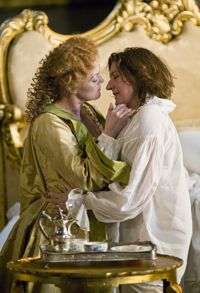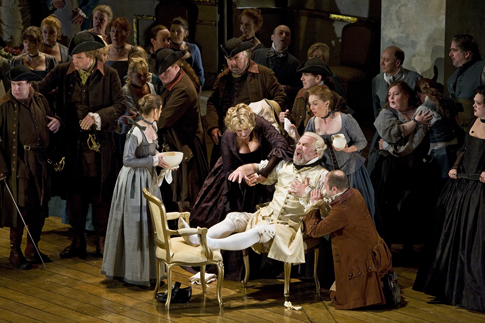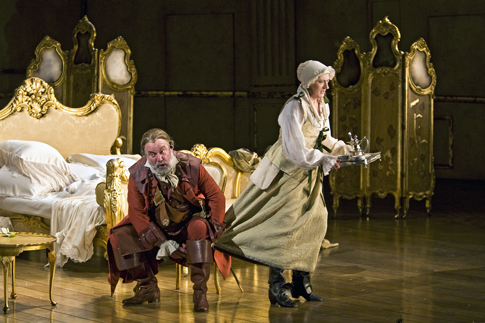04 Jun 2008
Der Rosenkavalier at ENO
It is worth remembering that prior to the première of Strauss’s opera in 1911, the working title was ‘Ochs auf Lerchenau’.

It is worth remembering that prior to the première of Strauss’s opera in 1911, the working title was ‘Ochs auf Lerchenau’.
This might perhaps have been a fitting subtitle for ENO’s current production, given John Tomlinson’s tour de force of a performance. He appeared in ENO’s last two stagings (at least once alongside the current Marschallin, Janice Watson) but his Ochs never owned the stage quite like this. The glint in this gravelly bass’s eye is at once repulsive and endearing, and he makes something of every word of Alfred Kalisch’s slightly clunky English translation, a feat equalled only by the excellent Andrew Shore as Faninal.
 Janice Watson (The Marschallin) / Sarah Connolly (Octavian)
Janice Watson (The Marschallin) / Sarah Connolly (Octavian)
This should be a good thing, and indeed it is, on its own terms. The
downside is that Tomlinson plays his colleagues off the stage, and the
impression that is left on the memory a couple of hours after curtain-down is
of a brilliant, riotous Act 2. The erotic tumult of the opera’s opening,
Octavian and Sophie’s mutual falling in love, and the Marschallin’s
gracious sacrifice... all were wonderful at the time, but were all but
obliterated by the memory of this extraordinary Ochs.
That is not to say that there was much evidence of weakness in the rest of the cast. Janice Watson’s Marschallin was not the glacial grande dame we often see, and let her mask slip at times — for a mere moment in the confrontation with Ochs in Act 3, her grace and poise yielded to a flash of unrefined hot-blooded fury. Here we saw a rare glimpse of the fiery spirit which surely attracted Octavian in the first place. Later, when she observed him with Sophie, the façade slipped in quite another direction.
Sarah Connolly’s Octavian was expansive of voice and full of youthful vigour, loose-limbed and confident in his unofficial temporary role as lord of the manor in the Feldmarschall’s absence. I had been doubtful about Connolly’s ability to play a youth, after the succession of Handelian warrior-heroes on which her career is founded, but she captured ideally the petulance and over-sensitivity of the selfish teenager behind this young aristocrat’s aristocratic pomp and chivalry.
It is good to hear the accomplished soubrette Sarah Tynan in a proper lyrical role such as Sophie; she looks lovely, is able to play the right age, and is a feisty little madam with or without Octavian’s assistance. Her silvery soprano sits ideally with the musical character of the scenes in which she sings, and is rightly as far the vocal opposite of Ochs as it is possible to be.
 John Tomlinson (Baron Ochs) centre group
John Tomlinson (Baron Ochs) centre group
Rosenkavalier was, of course, Strauss’s answer to Figaro, and director David McVicar’s 2005 staging of Mozart’s work for the Royal Opera clearly took much inspiration from this production which originated at Scottish Opera in 1999. At times this Rosenkavalier seems full of McVicar clichés, but as it predates most of the work for which he’s now renowned, it should rightly be seen as an original. One such ‘cliché’ was the deconstructed rococo set, a single one used (with contrasting embellishments) for all three acts. Another, repeated in Figaro, was the attention to detail in the direction of a multitude of minor roles, servants, and non-singing characters. Harry Ward’s idiotic, mugging Leopold stood out, but from the Singer (Alfie Boe, replacing an indisposed Dwayne Jones) to the Milliner, all were clearly defined and full of personality. Stuart Kale’s Valzacchi was partnered by an exceptional Annina in Madeleine Shaw, currently on ENO’s Young Singers programme.
 John Tomlinson (Baron Ochs) / Sarah Connolly (Octavian as ‘Mariandel’)
John Tomlinson (Baron Ochs) / Sarah Connolly (Octavian as ‘Mariandel’)
Sometimes, the concentration on detail is to the detriment of the bigger moments. The Marschallin’s exit after the trio is unsympathetically staged, with Janice Watson forced to edge her way clumsily through a side doorway that is too small for her immense dress, and lacks impact. Ed Gardner’s conducting, though sumptuous when required, is fairly conservative and supports rather than adds to the intricate character of the performance. But McVicar’s ability to make this lengthy and variably-paced opera flow so well — even with standard musical cuts opened out — is a credit to his dramatic intelligence.
Ruth Elleson © 2008